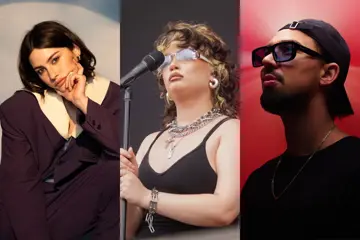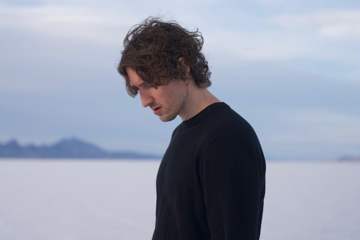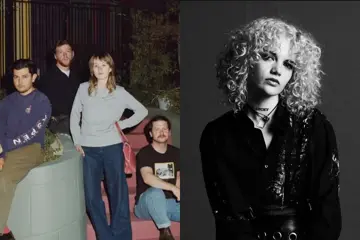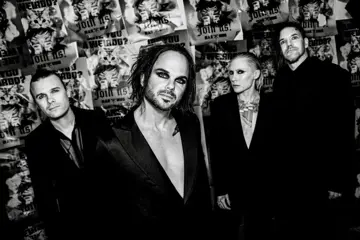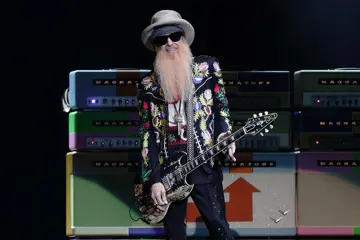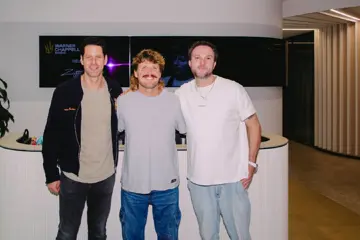Entering an empty meeting room on the third floor of ACON, Ryan Corr and Craig Stott walk as if tethered to two of some 12 seats and sit, side by side. As Corr retakes his seat a small projectile shoots at me from his direction. A leather strap, snapped, lies on the desk beneath his now-bare wrist and across from it, beneath me, the small metal charm, a heart, that was flung from the bursting band. "I wear my heart on my sleeve," Corr says with a hint of sheepishness and resignation.
There's been a lot of that recently — coincidences, good timing — so much so it seems some folklore is developing, painting Timothy Conigrave as a poignant and playful poltergeist.
"The whole process is shrouded in something special," says Corr. Then, in the first of many instances of Corr and Stott speaking in unison: "Only magical people get talked about" (quoting Conigrave).
"The whole timing of this has been serendipitous"
Corr recounts an anecdote from the premier at Sydney Film Festival where the cyan and yellow lights of the onscreen image quite simply carked it: "The blue and the yellow had knocked off and it was pink! The whole start came up in this vibrant pink! Anna [Conigrave] came up to me and said, 'I can guarantee you that was Tim flicking the switch up there. Isn't that amazing?!'"
A few days later Anna once again credited Tim when a malfunctioning elevator kept her from a talk with the duo promoting the film.
Before the production even began there was an element of that same thing, a certain magic in the air that hung around the film. Both Corr and Stott credit it for landing them their roles in such a monumental Australian film.
Don't miss a beat with our FREE daily newsletter
"I've set the mark way too high," jests Stott, who just a few years ago would walk past a sign advertising an Australian Theatre Company production of Holding The Man while walking to his illegal job as a dishwasher in a Hollywood Thai restaurant.
"After a chemistry test in London we came downstairs afterwards and said to each other..." Corr is interrupted once again by their unison: "I hope you get it."
"That's a start for something great," Corr grins somewhat conspiratorially.
"I called Ryan one day after that chemistry test in London, once we were on, and I said, 'Ryan, I think we should be boyfriends for the shoot,' and he sent me the most beautiful message back, it was so eloquent, he said he was already experiencing such a love for me, in such a way, that we didn't need that. And he was so right, we were already developing a relationship, and that's where it ceases to be acting: what you see up there is Craig and Ryan underneath John and Tim, you see a real relationship evolving as we were shooting, and as we needed each other."
"Tony Abbott had the ability to be the prime minister to enable people to be in love with who they choose..."
The relationship saw Corr guiding Stott through the seven weeks of hardcore dieting required to physically prepare to portray John Caleo at his most vulnerable, his body stripped away by illness. "That was distance from just being acting as well. Craig was in a vulnerable state, and it became natural to care for him in that way."
"The whole timing of this has been serendipitous — Kylie Du Fresne, the producer, spoke about this script wanting to tell itself, you know? The rights have been bought for a while and, like The Sapphires, it could have been done two years before or two years after, for some reason it was telling them now's the time," says Corr.
Despite this, the timing couldn't be more pertinent for the release of Holding The Man. Earlier today Corr and Stott deigned to grace The Breakfast Show, and its commentary on the Coalition party room's decision not to allow a free vote on same-sex marriage the evening prior.
"Two thirds of Australia, left or right, agree with same-sex marriage," Corr says, "and Tony Abbott had the ability to be the prime minister to enable people to be in love with who they choose, marry who they choose..."
"And have it recognised," Stott weighs in.
"And in steps Holding The Man," Corr smiles. "In a wonderful way Tim's legacy and his fight for marriage equality is won — although I don't think he would have given much of a shit about it really within Tim's politics — but gay rights, his political life; in a wonderful way this film is a continuation of that legacy, as was his book, the completion of which willed him to live. And what a wonderful thing that in the midst of this debate, that this is where the film is landing and I don't for a second think that's just..."
"Coincidence," they say in unison.

